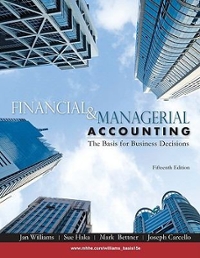Question
Carson Machinery Inc. (CMI) is a publicly traded, Canadian-based manufacturer of automotive parts. It operates production facilities in three provinces. Investors benchmark earnings compared to
Carson Machinery Inc. (CMI) is a publicly traded, Canadian-based manufacturer of automotive parts. It operates production facilities in three provinces. Investors benchmark earnings compared to market expectations and to other similar companies. Wherever feasible, CMI prefers to adopt accounting policies that increase short-term profitability, to keep the equity base strong. As part of its compensation package, CMI awards bonuses to its executives on an annual basis. The primary criterion considered by the board of directors when determining the size of the bonuses to be awarded to the executives overseeing production is the firm's actual earnings before interest and taxes (EBIT) compared to the budgeted EBIT for the year. Projected financial results for its Quebec facility, which produces engine components for auto makers, is below. However, projections are subject to significant fluctuation, because demand for certain components is driven by consumer demand for the various automotive models. Demand is also driven by general economic conditions. CMI may anticipate demand for one component, but then the market heads in the opposite direction, which increases down time to retool the facility.
Projected financial results Quebec production facility
Year 1 Year2 Year3
Hours of Production 4,800 5,760 5,500
Revenue (1) 7,200,000 8,640,000 8,250,000
COGS (2) 2,880,000 3,559,680 3,500,970
Administration (3) 2,160,000 2,224,800 2,291,544
EBITDA 2,160,000 2,855,520 2,457,486
Depreciation (4) 1,000,000 1,000,000 1,000,000
EBIT 1,160,000 1,855,520 1,457,486
Notes:
(1) Based on expected hours of production; average revenue per hour is $1,500.
Year 1: 4,800 production hours
Year 2: 5,760 production hours
Year 3: 5,500 production hours
(2) Based on expected hours of production; $600 per hour, adjusted for inflation.
Year 1: 4,800 hours $600
Year 2: 5,760 hours ($600 1.03)
Year 3: 5,500 hours ($600 1.03 1.03 )
(3) Inflation factor of 3% per year. Will not be materially affected by changes in production.
(4) Depreciation expense excluding the EX8500 robotics equipment
To reduce downtime (and hopefully smooth results), CMI is automating as much of its Quebec facility as possible. Francois Leroy, the company's chief financial officer, has asked you, the financial controller and a CPA, to make recommendations with respect to an appropriate depreciation method for a brand-new class of robotics equipment recently purchased by CMI for the Quebec facility.
Details of the equipment
The EX8500 costs $8 million
The manufacturer advises that the machine can be run up to 8,500 hours per year. Your engineering staff has indicated that this is probably on the high side and could only be achieved in ideal circumstances
. Your counterparts in other manufacturing sectors that use similar machinery advise that the maximum capacity of this machine, when allowing for shutdowns for maintenance and emergency repairs, is closer to 7,500 hours per year. They also advise that, as the machine ages, the capacity declines by about 5% per year, because the time lost for maintenance and repair shutdowns increases as the machine ages.
The manufacturer advises that the estimated useful life of the EX8500 varies depending on its usage, as shown in the following table:
Yearly Production (% of Max) Estimated Max Useful Life
75-100 10 years- 85,000 hours
50-75% 15 years- 96,000 hours
25-50% 25 years- 107,000 hours
Your research has determined that it is difficult to resell equipment like the EX8500 that is more than five years old because of the ongoing advances of technology for this type of equipment, as well as the high dismantling and shipping costs.
Other information
CMI uses the cost model to subsequently measure the value of all its PPE
. CMI currently uses the straight-line method to depreciate all its depreciable non-production PPE. The depreciation method used by CMI to depreciate PPE directly involved in production is governed by the nature of the PPE. Straight-line, double-declining-balance, and units-of-production methods are all used in various circumstances. When CMI uses the double-declining-balance method of depreciation, the rate used is two times the percentage used in the straight-line method.
CMI operates the Quebec facility for 16 hours a day, 300 days a year. CMI just signed a 15-year contract with the auto maker it supports, so the facility will be active for at least that period of time, though volumes produced will continue to vary based on consumer preferences. CMI expects the equipment to be in use, on average, 5,400 hours per year over the 15-year period.
The senior vice-president of production has suggested that CMI should adopt the straightline method to depreciate the EX8500 because he would like to produce the same volume of auto parts each year
Problem:
Create a memo to Francois Leroy analyzing each of the three most widely used depreciation methods. Your memo should include a summary of pertinent information and do the following:
Identify and explain what each of the methods entails, and then evaluate the advantages and disadvantages of each method.
Determine whether each of the three depreciation methods would be suitable and explain why or why not
. Recommend the estimated equipment life to be used (however, use management's assumptions of a 15-year useful life when calculating depreciation expense).
Determine the estimated residual value to be used when calculating depreciation expense
. Recommend a depreciation method. Quantify the impact on CMI's projected EBIT for each option under consideration.
Step by Step Solution
There are 3 Steps involved in it
Step: 1

Get Instant Access to Expert-Tailored Solutions
See step-by-step solutions with expert insights and AI powered tools for academic success
Step: 2

Step: 3

Ace Your Homework with AI
Get the answers you need in no time with our AI-driven, step-by-step assistance
Get Started


